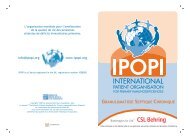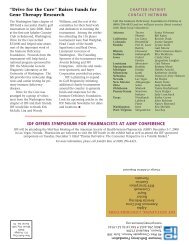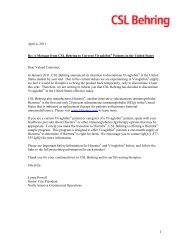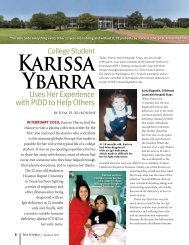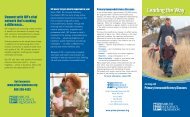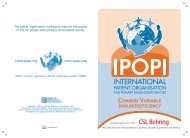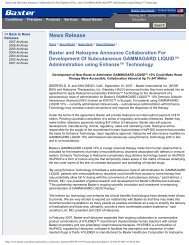IDF Patient & Family Handbook for Primary Immunodeficiency ... - IDFA
IDF Patient & Family Handbook for Primary Immunodeficiency ... - IDFA
IDF Patient & Family Handbook for Primary Immunodeficiency ... - IDFA
You also want an ePaper? Increase the reach of your titles
YUMPU automatically turns print PDFs into web optimized ePapers that Google loves.
Infants and Children with <strong>Primary</strong> <strong>Immunodeficiency</strong> Diseases 107<br />
Normalizing Your Child’s Life continued<br />
them understand their role in the family and what to<br />
expect as well as what is expected of them. If your<br />
child with primary immunodeficiency is unable to<br />
do his chores, reevaluate the expectations and find<br />
something else that he or she can do to contribute<br />
to the family. If he or she is able but not willing, or<br />
chooses not to follow through on an expectation,<br />
the consequences should be clearly stated,<br />
age-appropriate and similar to siblings, and carried<br />
out. This process of limit-setting and discipline<br />
should be the same <strong>for</strong> all children in the family.<br />
Similar to the pitfalls of relaxing family rules and<br />
expectations, providing children with rewards<br />
requires some careful consideration. As parents<br />
find, because there are so many trips to the<br />
physician’s office, it becomes clear that they<br />
cannot reward the child with every needle stick<br />
or test. Such procedures or treatments may<br />
indeed be challenging <strong>for</strong> your child. Planning and<br />
practicing ways of coping can help you and your<br />
child better manage difficult events. For those<br />
times when a reward is appropriate, provide your<br />
child with a few choices that blend into his or her<br />
everyday world. For example, on treatment days,<br />
allow your child to select a much loved activity or a<br />
favorite meal <strong>for</strong> dinner.<br />
Providing knowledge of your child’s condition to<br />
their friends and their friends’ parents at an early<br />
age helps to foster acceptance. They will grow up<br />
together knowing the special circumstances that<br />
surround them. Your child will know he or she is<br />
not so different after all.<br />
Preparing <strong>for</strong> School or<br />
Other Care Outside the Home<br />
In addition to their role with the health care team,<br />
parents also act as the link with their child’s other<br />
caregivers, such as those adults who interact<br />
with and supervise their children in childcare<br />
or school. The transition from infant/toddler to<br />
school-aged child is particularly challenging. Often<br />
this is the first occasion the child and parent are<br />
separated <strong>for</strong> an extended length of time. Also,<br />
the addition of new care providers can create<br />
anxiety <strong>for</strong> children and parents alike. Conversely,<br />
this opportunity to grow intellectually and<br />
emotionally should be greeted with enthusiasm as<br />
it represents a great milestone in life.<br />
Children are very perceptive and will often share<br />
their parents’ emotions during this change in life.<br />
An optimistic outlook beginning weeks, even<br />
months, be<strong>for</strong>e the first day away eases the<br />
transition to school or care outside the home.<br />
Many parents recommend advance preparation<br />
to feel more com<strong>for</strong>table with any specific<br />
concerns related to their child’s health needs.<br />
Preparation includes a refresher course on your<br />
child’s particular primary immunodeficiency and<br />
his or her current therapy. By reviewing your<br />
child’s medical diary with school officials and<br />
personnel, you will aid in educating them about<br />
your child’s condition and potentially facilitate<br />
the prediction of illness patterns in this new<br />
environment. Timing and early warning signs of<br />
illness should be discussed with key personnel<br />
(i.e., school nurses, teachers, counselors, and<br />
principals). Your child’s physician and other health<br />
care providers may also be called upon to answer<br />
any specific questions. Other items to consider<br />
include transportation on normal and sick days, as<br />
well as a phone “call down” list in case of illness.<br />
Appropriate letters from the physician about<br />
physical limitations, if any, medications to be given<br />
at school, and immunization recommendations,<br />
should be obtained in advance to allow resolution<br />
of specific concerns prior to the beginning of<br />
school. In addition, plan in advance with your<br />
child’s teachers <strong>for</strong> specific needs that may<br />
impact school routine. Special arrangements<br />
may be necessary <strong>for</strong> children who need frequent<br />
meals or restroom privileges due to intestinal<br />
malabsorption, hall passes or scheduled nursing<br />
visits <strong>for</strong> medication administration, and/or<br />
assignment of classes to minimize the effects of<br />
absences due to regularly scheduled treatments or<br />
doctor’s visits. Yearly review of these items should<br />
allow a safe and smooth transition throughout the<br />
school experience.<br />
Some parents have reported two types of<br />
misunderstandings that may arise among<br />
other people with little knowledge of primary








